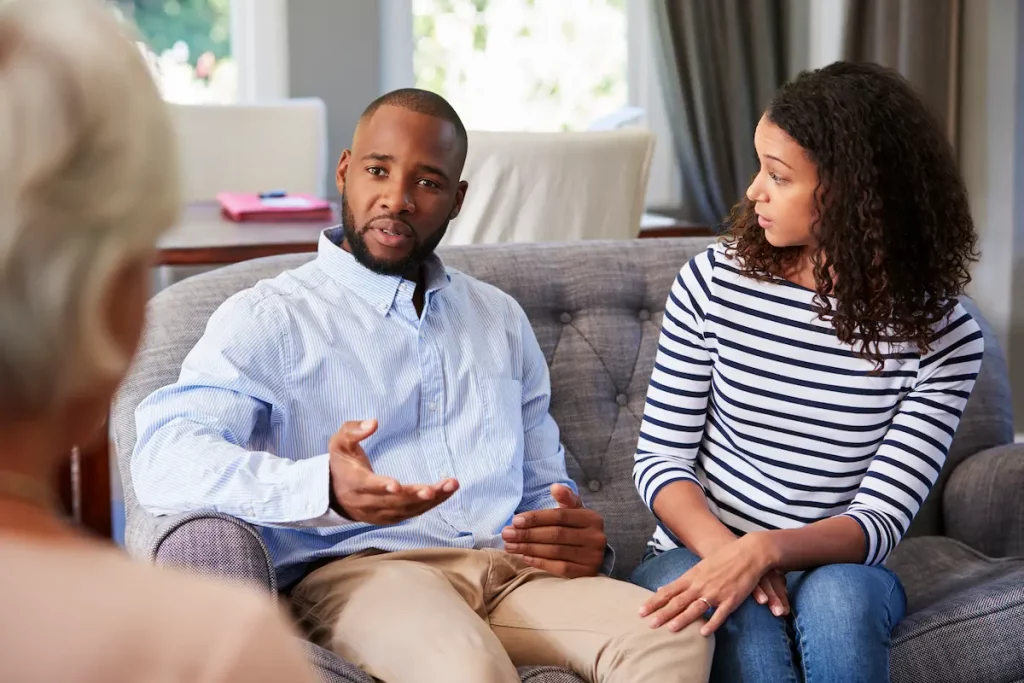Do you feel anxious and uneasy when you’re away from your boyfriend? Do you constantly worry about what he’s doing, who he’s with, or if he still loves you? If so, you may be experiencing separation anxiety from your significant other.
While separation anxiety is commonly associated with children and their parents, it can also occur in adults and romantic relationships. It may manifest as a fear of abandonment or a need for constant reassurance and contact with one’s partner.
In this article, we’ll explore the signs and symptoms of separation anxiety in romantic relationships, its potential causes, and how to manage it for a healthier partnership.

What Is Separation Anxiety?
Separation anxiety is a condition characterized by excessive fear or distress when one is separated from a person, place, or thing that provides safety and comfort.
It is not uncommon for people to experience separation anxiety from their significant other, as romantic relationships can be a major source of attachment and security.
Causes and triggers of separation anxiety can vary from person to person.
Some individuals may have experienced trauma or loss in the past that makes them more susceptible to developing this condition.
Attachment styles also play a role in how separation anxiety manifests in a relationship.
Those with anxious attachment styles tend to feel more insecure and dependent on their partners, which can lead to heightened feelings of distress when apart.
Communication patterns between partners can also impact the severity of separation anxiety.
If one partner is consistently unavailable or unresponsive, it can exacerbate feelings of fear and insecurity for the other.
In order to manage separation anxiety in relationships, self care techniques such as mindfulness practices and seeking support from loved ones can be helpful.
The impact of separation anxiety on relationships can be significant if left untreated.
It can lead to increased conflict, decreased trust, and even the dissolution of the relationship altogether.
Therefore, it is important for individuals experiencing separation anxiety to seek professional help and work towards developing healthier coping mechanisms.
Signs And Symptoms Of Separation Anxiety From A Boyfriend
Yes, it is possible to experience separation anxiety from your boyfriend.
Emotionally, it can manifest itself as feelings of sadness, worry, or insecurity.
Physically, it can cause symptoms such as headaches, nausea, or restlessness.
All these symptoms can occur when a person is struggling with their own anxiety related to the separation from their significant other.
Emotional Symptoms
Feeling emotionally overwhelmed is one of the most common symptoms of separation anxiety from a boyfriend. Managing emotions can be a challenging task, but there are ways to cope with it.
One effective strategy is to acknowledge and accept your feelings without judging yourself. Recognize that it’s okay to feel sad, anxious or worried about being apart from your partner.
Communication strategies can also help ease emotional distress caused by separation anxiety. Talk openly with your boyfriend about how you feel and what triggers your anxiety. Let him know what kind of support you need when he’s not around. This will help both of you understand each other better and create a stronger bond.
Self-care techniques and mindfulness practices are essential for managing emotional symptoms of separation anxiety. Take care of yourself physically by eating well, exercising regularly, and getting enough sleep. Practice meditation, yoga or deep breathing exercises to calm your mind and reduce stress levels.
Don’t forget to seek support from your family, friends or a therapist who can provide guidance and advice on how to cope with separation anxiety effectively.
Overall, Emotional Symptoms are an integral part of Separation Anxiety from a Boyfriend that should not be ignored. While it may seem challenging at first, managing emotions through communication strategies, self-care techniques, mindfulness practices, and support systems is crucial for maintaining a healthy relationship with yourself and your partner.
Remember that it’s okay to feel vulnerable sometimes; what matters most is how you deal with those emotions in a positive way.

Physical Symptoms
Now that we’ve discussed managing emotional symptoms of separation anxiety from a boyfriend, let’s move on to physical symptoms.
These symptoms may include muscle tension, sleep disturbances, nausea and vomiting, and even panic attacks.
Physical symptoms can be just as challenging to deal with as emotional symptoms, but there are ways to cope.
One strategy for managing physical symptoms is through breathing exercises.
Deep breathing techniques can help calm your body and reduce muscle tension.
Similarly, practicing mindfulness and relaxation techniques such as yoga or meditation can also help ease physical symptoms of separation anxiety.
It’s important to note that if physical symptoms persist or become severe, it may be helpful to seek medical attention or speak with a therapist who can provide additional support and guidance in managing these symptoms.
Remember that managing both emotional and physical symptoms of separation anxiety is crucial for maintaining a healthy relationship with yourself and your partner.
Understanding The Psychology Behind Separation Anxiety
Separation anxiety is an excessive fear of being away from a person or place that is familiar and safe.
It can be caused by traumatic events in the past, or even by changes in routine or environment.
It’s important to understand that it can affect anyone, even those in relationships, and can be incredibly distressing.
It’s important to be aware of the signs and symptoms, as well as the causes, so that you can help someone who may be struggling with separation anxiety.
Definition Of Separation Anxiety
You wake up in the morning and your heart races at the thought of being away from your boyfriend for even a few hours. You feel anxious and panicky, thinking about all the possible scenarios that could unfold while you’re apart. This is what it feels like to have separation anxiety from your partner.
Causes of this condition can vary, but often stem from past traumas or attachment issues. It can also be exacerbated by relationship dynamics that involve dependency or fear of abandonment.
Treatment for separation anxiety typically involves therapy, medication, or a combination of both. Therapy can help address underlying causes and provide coping mechanisms for dealing with anxious thoughts and feelings. Medication may also be prescribed if symptoms are severe enough to interfere with daily life.
Prevention strategies include working on building a strong sense of self and fostering healthy relationships that allow for autonomy and independence.
The impact of separation anxiety on a relationship can be significant, leading to feelings of suffocation or resentment from both parties involved. It’s important to communicate openly and honestly with your partner about how you’re feeling and work together to find ways to manage the anxiety in a healthy way.
With patience, understanding, and professional support if needed, it is possible to overcome separation anxiety and enjoy a fulfilling life both alone and with your loved ones.
Causes Of Separation Anxiety
Understanding the psychology behind separation anxiety involves delving into its root causes. Common triggers of this condition include attachment styles, communication patterns, personal insecurities, and past relationship experiences.
Attachment styles developed in childhood can influence how we form relationships later on in life. For example, if a person experienced neglect or inconsistency in their early years, they may develop an anxious attachment style that leads to clinginess and fear of abandonment.
Communication patterns also play a role in separation anxiety. If partners are not open and honest with each other about their needs and feelings, it can lead to misunderstandings and exacerbate feelings of anxiety.
Personal insecurities such as low self-esteem or a history of trauma can also contribute to separation anxiety. Past relationship experiences can also have a significant impact on the development of separation anxiety. If a person has experienced abandonment or betrayal in previous relationships, they may be more likely to feel anxious when separated from their current partner.
Understanding these underlying causes is crucial for effectively treating separation anxiety. Therapy can help individuals address past traumas and develop coping mechanisms for managing anxious thoughts and feelings. It’s important for partners to communicate openly with each other about their needs and fears in order to work together towards building a healthy and secure relationship.
Factors That Contribute To Separation Anxiety In Romantic Relationships
Yes, it is possible to experience separation anxiety from one’s partner.
Fear of abandonment and emotional dependency can both contribute to this anxiety.
When one becomes overly dependent on their partner, they may feel scared or vulnerable when separated.
Similarly, fear of abandonment can cause someone to become anxious when their partner isn’t around.
Fear Of Abandonment
Do you feel anxious when your partner is away? Do you constantly worry that they will leave you? If so, you may be experiencing separation anxiety from your boyfriend.
Understanding abandonment and its impact on relationships can help alleviate these feelings of fear of loss. The fear of abandonment is a common issue that affects many people in romantic relationships. This fear can stem from childhood experiences or past relationship trauma. It can manifest as clinginess, jealousy, and other behaviors that push the partner away.
Coping mechanisms such as therapy or communication with your partner can help address these fears and build trust. Building trust is crucial to overcoming separation anxiety in romantic relationships. Trust involves being vulnerable with your partner and believing in their commitment to the relationship.
By communicating openly and honestly about your fears and concerns, you can foster a deeper sense of understanding and strengthen the bond between you and your partner. Remember that it takes time and effort to build trust, but it is essential for a healthy and fulfilling relationship.

Emotional Dependency
Another factor that contributes to separation anxiety in romantic relationships is emotional dependency. Emotional dependency, also known as codependency, is a pattern of behavior where one partner relies heavily on the other for emotional support and validation. This can stem from attachment issues, low self-esteem, and trust issues.
Individuals who struggle with emotional dependency may have difficulty setting healthy boundaries and communicating their needs effectively. They may fear being alone or abandoned by their partner, leading to clingy or needy behavior. This can put a strain on the relationship as the other partner may feel suffocated and overwhelmed.
To address emotional dependency in a relationship, it is important to focus on building self-esteem and establishing healthy boundaries. Therapy can be helpful in identifying and addressing underlying issues that contribute to this pattern of behavior.
Communication is also key in creating a more balanced dynamic where both partners feel respected and heard. By working together to build trust and establish healthy habits, couples can overcome emotional dependency and create a stronger foundation for their relationship.
Coping Strategies For Managing Separation Anxiety
Identifying triggers of separation anxiety can be difficult, but it’s important to recognize what sets it off, whether it’s from your boyfriend or other sources.
Developing coping skills is key to managing the anxiety when it arises; this could include deep breathing, meditation, talking to someone you trust, or writing down your thoughts.
It’s also important to remember that it’s okay to talk to your boyfriend about your feelings and that he may be able to provide understanding and support.
Lastly, making sure to practice self-care and take time for yourself can be helpful in managing the anxiety.
Identifying Triggers
Do you feel like you can’t be away from your boyfriend for too long? Do you experience overwhelming anxiety at the thought of being separated from him? If so, you may be experiencing separation anxiety.
Recognizing behaviors that trigger your anxiety is crucial in managing this condition. Common triggers for separation anxiety include fear of abandonment, feeling out of control, and uncertainty about the future. It’s important to identify these triggers and develop coping strategies to manage them.
Communication styles and attachment styles can also play a role in triggering separation anxiety. By understanding these patterns and working on developing healthier communication and attachment styles, you can reduce your overall level of anxiety.
If separation anxiety is impacting your relationship patterns, it’s important to seek help from a mental health professional. They can help you develop effective coping strategies and work through any underlying issues that may be contributing to your anxiety.
Remember that seeking help is a sign of strength, not weakness. With the right support, you can learn to manage your separation anxiety and build healthier relationships with those around you.
Developing Coping Skills
Now that we have discussed the common triggers of separation anxiety, it’s time to talk about developing coping skills. Coping strategies are essential in managing the symptoms of separation anxiety and preventing them from taking over your life.
There are various methods you can use to cope with your anxiety, such as mindfulness techniques, social support, self-care practices, distraction methods, and communication strategies.
Mindfulness techniques involve focusing on the present moment without judgment or worry. You can practice mindfulness through meditation, deep breathing exercises, or yoga. These techniques help you become more aware of your thoughts and emotions and develop a sense of calmness and stability.
Social support is also crucial in managing separation anxiety. Surround yourself with people who understand your struggles and provide emotional support. Joining a support group or talking to a trusted friend or family member can help you feel less isolated and more connected.
Self-care practices such as exercising regularly, eating healthy foods, getting enough sleep, and engaging in activities that bring you joy can also help reduce your anxiety levels. Distraction methods like watching movies or reading books can divert your attention from negative thoughts and feelings.
Communication strategies such as expressing your needs clearly and listening actively can enhance your relationship with others while reducing stress levels. It’s important to maintain open communication with loved ones about how you’re feeling so they can offer the necessary support.
In summary, developing coping skills is an essential step towards managing separation anxiety effectively. Mindfulness techniques, social support, self-care practices, distraction methods, and communication strategies are all useful tools for coping with anxiety symptoms. Remember that it’s okay to seek professional help if needed as well!

Seeking Professional Help For Separation Anxiety
I’m wondering if it’s possible to have separation anxiety from your boyfriend?
Identifying separation anxiety can be difficult, but consulting with a mental health professional can help. Seeking professional help can be a great way to explore the root causes of this anxiety and develop healthy coping strategies.
It’s important to remember that there are many resources available to help manage separation anxiety, such as therapy, support groups, and medication.
It’s also important to be mindful of your own self-care when it comes to coping with separation anxiety. Finding healthy coping strategies that work for you, such as engaging in physical activity or creative hobbies, can be an effective way to manage your anxiety.
Lastly, it’s important to remember that seeking professional help can be a great way to help manage your separation anxiety.
Identifying Separation Anxiety
It’s hard to imagine not being able to breathe without your boyfriend by your side. But what if you find yourself constantly worrying about him leaving you, even for a short while? Recognizing triggers, like excessive worry and fear of abandonment, are the first step in identifying separation anxiety. It’s important to realize that these emotions are not uncommon, and seeking professional help can provide healthy coping mechanisms that allow for a better quality of life.
Support systems are crucial when dealing with separation anxiety. Friends and family can offer comfort and reassurance during times of distress. Communication strategies should also be put into place with loved ones. Letting them know how they can help you during anxious episodes is essential in building trust and understanding.
Finally, self reflection and self care should be prioritized when dealing with separation anxiety. Acknowledging personal strengths and weaknesses can lead to greater self-awareness and improved coping techniques. Taking time for relaxation activities, such as yoga or meditation, can also aid in managing stress levels.
Remember that seeking professional help for separation anxiety is a positive step towards mental wellness.
Seeking Professional Help
Managing emotions is crucial when dealing with separation anxiety. It can be challenging to cope with the intense feelings of fear and worry that arise when faced with being apart from a loved one. Seeking professional help through therapy sessions, support groups, or medication options can provide individuals with the tools and resources needed to manage these emotions effectively. These mental health resources offer practical strategies to help individuals work through their separation anxiety.
Therapy sessions are a common treatment option for those struggling with separation anxiety. Through talk therapy or cognitive-behavioral therapy, individuals can learn to identify and challenge negative thought patterns that contribute to their anxiety.
Support groups can also provide a safe space for individuals to share their experiences and connect with others who are going through similar struggles. Additionally, medication options may be prescribed by a healthcare professional in certain cases where symptoms are severe.
Self care techniques should also be incorporated into any treatment plan for separation anxiety. Activities such as exercise, meditation, or journaling can help promote relaxation and reduce stress levels. Practicing self-compassion and prioritizing personal needs is essential in managing separation anxiety effectively.
Remember that seeking professional help is not a sign of weakness but rather a proactive step towards improving mental wellness.
Coping Strategies
Now that we have discussed the importance of seeking professional help for separation anxiety, let’s dive deeper into coping strategies that individuals can incorporate into their treatment plan.
Coping strategies are tools and techniques that can help manage symptoms of anxiety and promote overall wellbeing.
Breathing exercises are a simple but effective way to reduce feelings of anxiety. By taking slow, deep breaths, individuals can activate their parasympathetic nervous system and promote relaxation.
Positive self-talk is another technique that can be used to challenge negative thought patterns and replace them with more constructive ones.
Mindfulness techniques, such as meditation or yoga, can also be helpful in managing separation anxiety. These practices encourage individuals to focus on the present moment without judgment, which can reduce feelings of worry and fear about the future.
Distraction methods, such as engaging in a hobby or listening to music, can also provide temporary relief from anxiety symptoms.
Finally, seeking support is crucial when managing separation anxiety. This support can come from friends, family members, or mental health professionals. It is important for individuals to feel heard and understood during times of distress. Remember that it is okay to ask for help and reach out when needed.
By incorporating these coping strategies into a treatment plan for separation anxiety, individuals can work towards achieving greater emotional regulation and overall wellness. With time and practice, these techniques can become second nature and provide individuals with the tools needed to effectively manage their anxiety long-term.
Building Stronger Relationships To Reduce Separation Anxiety
Some people may argue that building stronger relationships to reduce separation anxiety is easier said than done. They may even question the effectiveness of such an approach, especially when dealing with situations involving romantic partners. However, it is important to remember that relationships are dynamic and ever-changing, and what works for one couple may not work for another.
Effective communication strategies are essential in any relationship, but they become even more crucial when dealing with separation anxiety. It is important to openly express feelings and concerns, as well as actively listen to your partner’s perspective. This helps build mutual understanding and allows both parties to work together towards a solution.

Trust building is also key in reducing separation anxiety. This involves being honest and transparent with your partner, as well as following through on promises and commitments made. Spending quality time together can also help strengthen trust by creating positive shared experiences. Additionally, having a supportive network of friends or family members can provide emotional support during times of separation.
Personal growth should also be prioritized in any relationship. This involves taking care of oneself physically, emotionally, and mentally. By working on personal growth, individuals can become more resilient and better equipped to handle challenges that arise in their relationships.
Ultimately, building stronger relationships requires effort from both parties but can lead to a deeper connection and reduced separation anxiety over time.
Related Reading: Call Of Duty Terms To Say To Your Boyfriend
Overcoming Separation Anxiety And Moving Forward In Your Relationship
One important step in overcoming separation anxiety in your relationship is to establish communication strategies with your boyfriend. This can include setting aside time each day to check in with each other, expressing your feelings openly and honestly, and actively listening to one another without judgment.
Another helpful approach to overcoming separation anxiety is to engage in trust building exercises. These might include activities such as sharing personal stories or secrets, practicing mutual vulnerability, or engaging in collaborative problem-solving. By working together on these types of exercises, you can cultivate a stronger sense of connection and intimacy with your partner.
Mindfulness practices and self care routines can also help alleviate the symptoms of separation anxiety. By taking time for yourself each day to engage in activities that bring you joy and relaxation, such as yoga or meditation, you can reduce stress levels and improve your overall well-being.
Additionally, setting healthy boundaries with your partner – such as carving out time for yourself or prioritizing your own needs – can help prevent feelings of dependency and support a more balanced relationship dynamic.
By incorporating these strategies into your daily routine, you can work towards overcoming separation anxiety and building a stronger foundation for your relationship with your boyfriend. Remember that it takes time and effort to make lasting changes, but by prioritizing open communication, trust building exercises, mindfulness practices, self care routines, and healthy boundaries, you can move forward together with greater confidence and security.
Frequently Asked Questions
Can Separation Anxiety Only Occur In Romantic Relationships Or Can It Happen In Friendships As Well?
Separation anxiety is not exclusive to romantic relationships and can occur within friendships as well. Friendship dynamics play a significant role in how separation anxiety manifests between friends, and coping mechanisms and communication strategies are crucial in managing it effectively.
Societal expectations of the importance of romantic relationships over friendships may also contribute to the intensity of separation anxiety experienced in friendship breakups. Additionally, cultural influences may dictate the level of emotional attachment that individuals feel towards their friends, further impacting their ability to cope with separation anxiety.
Therefore, it is essential to acknowledge that separation anxiety can affect any type of relationship and to develop healthy coping mechanisms and communication strategies regardless of the context.
How Long Does It Typically Take To Overcome Separation Anxiety?
Coping with separation anxiety can be a challenge, but there are various therapy options and self-help techniques that can help individuals overcome it.
Common triggers for separation anxiety include changes in routine, new environments, and stressful situations.
The impact on daily life can be significant, as individuals may avoid certain activities or experiences due to fear of separation.
Coping strategies such as deep breathing exercises, mindfulness practices, and cognitive-behavioral therapy can all be effective in managing symptoms of separation anxiety.
It is important to seek professional help if symptoms persist or significantly impact daily life.
Can Distance In A Relationship Trigger Separation Anxiety Even If The Couple Has Been Together For A Short Period Of Time?
As the old adage goes, absence makes the heart grow fonder. However, for some couples, distance can trigger separation anxiety regardless of how long they’ve been together.
The effects on mental health can be debilitating and have a significant impact on daily life.
It’s important for both partners to communicate openly and establish coping strategies to manage the anxiety.
Seeking professional help may also be necessary to address underlying issues and develop effective communication tactics.
Is There A Genetic Component To Separation Anxiety Or Is It Solely Based On Experiences And Past Traumas?
When it comes to separation anxiety, there is a debate between the influence of nature vs nurture.
While experiences and past traumas can certainly contribute to the development of this condition, research has also shown that there may be a genetic component at play.
Additionally, attachment styles formed in childhood can impact how individuals cope with separation and loss later in life.
Coping mechanisms such as therapy techniques can help individuals learn healthy ways to manage their anxiety and improve their overall well-being.
Ultimately, understanding both the environmental and biological factors contributing to separation anxiety can lead to more effective treatment approaches.
Can Separation Anxiety Be A Sign Of A Deeper Underlying Issue In The Relationship?
Separation anxiety can sometimes be a sign of deeper issues within a relationship.
Addressing insecurities and communication challenges can help identify potential sources of anxiety.
Therapy options may also be beneficial, as a trained professional can assist in developing coping mechanisms and setting healthy boundaries.
It’s important to recognize that separation anxiety is not always indicative of the strength or health of a relationship, but rather an individual’s emotional response to perceived threats to the connection with their partner.
By addressing these underlying issues, couples can work towards building a stronger, more fulfilling partnership.
Conclusion
In conclusion, separation anxiety can occur in any type of relationship, not just romantic ones. It can take varying amounts of time to overcome depending on the individual and the severity of their anxiety.
Distance in a relationship can certainly trigger separation anxiety, even if the couple has only been together for a short period of time.
While past experiences and traumas may play a role in developing separation anxiety, there may also be a genetic component involved.
It’s important to recognize that separation anxiety could be a sign of deeper underlying issues within the relationship that need to be addressed.
Whether it’s seeking therapy or communication with your partner, taking action towards resolving these issues can lead to a healthier and happier relationship overall.
Don’t let separation anxiety control your life – take steps towards finding solutions and building stronger relationships today.
